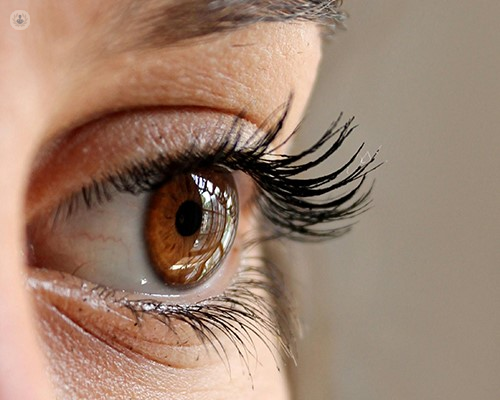Dry eye explained: Insights and solutions
Escrito por:In his latest online article, Mr Sachin Patel gives us his insights into dry eye. He talks about the main symptoms, lifestyle changes or habits that could worsen symptoms, if dry eye could be a symptom of other underlying health conditions, medical treatments or procedures and effective home remedies.

What are the main symptoms of dry eye and how can I recognise them?
The main symptoms of dry eye usually involve sensations of burning, redness, and itchiness, with many describing an overall feeling of extreme dryness in the eyes. Yet, there are additional, less conventional symptoms that individuals may experience, such as fluctuations in vision, discomfort in the eyes, a sense of heaviness in the eyelids, or a general feeling of something being amiss despite the overall normal health of the eyes. Dry eye can manifest in various ways that aren't always articulated clearly.
What lifestyle changes or habits can worsen dry eye symptoms?
The main trend we observe in the lifestyle and habit shifts associated with dry eyes is closely tied to increased screen usage, especially with the surge in remote work due to COVID. Prolonged periods of staring at screens, be it on a digital phone or a desktop PC, lead to reduced blinking frequency and overall decreased eye movement. These subtle alterations significantly contribute to what we term the 'dry eye epidemic’.
Can dry eye be a symptom of other underlying health conditions?
Dry eyes can have various underlying causes within the body, with autoimmune disorders being a common factor. Inflammation in the body is a significant contributor to the development of dry eyes, given that dry eyes are essentially an inflammatory condition. Additionally, an increasing number of individuals are experiencing dry eyes as a side effect of certain medications. This includes cases where young teenagers who have taken acne medication, like Roaccutane, may develop dry eyes later on. Furthermore, shifts in the body, particularly hormonal changes, make dry eyes more prevalent in women than men. Therefore, when investigating the causes of dry eyes, it is crucial to conduct a comprehensive examination, which we routinely perform during our assessments.
What are the available medical treatments or procedures to alleviate dry eye discomfort? Are there any effective home remedies or treatments for managing it?
The treatment for dry eyes primarily focuses on alleviating symptoms, and at our clinic, we employ a three-stage approach. First, there are home remedies that patients can implement to reduce dry eye symptoms, such as modifying habits, taking breaks from screens, and working in better-ventilated spaces. In some cases, we may recommend warm eye bags or electric ones to address gland dysfunction, a key contributor to dry eyes. Additionally, there are various eye drops available on the market that can temporarily mask dry eye symptoms, but choosing the right one is crucial, as not all drops are suitable.
It's important to note that home remedies have limited efficacy, essentially providing a temporary solution. The second approach involves medical management, specifically the use of anti-inflammatory eye drops. Given that dry eyes involve inflammation, short-term use of these drops is considered. However, prolonged use of steroids is avoided due to potential secondary issues. The third option, an area in which our clinic excels, involves in-practice treatments. The primary focus of this stage is to reduce inflammation, achieved through intense pulse light treatment. Our clinic possesses the only FDA-cleared IPL machine, and we also offer a unique procedure called probing, which opens up oil glands. Additionally, we provide thorough eyelid cleaning to address blepharitis effectively.
A groundbreaking development slated for early 2024 is the introduction of amniotic membrane treatment. This involves using a membrane derived from the centre of the placenta, with natural healing properties for the cornea. These innovative approaches position us at the forefront of advancements in dry eye treatment.
Mr Sachin Patel is an esteemed optometrist with over 15 years of experience. You can schedule an appointment with Mr Patel on his Top Doctors profile.


